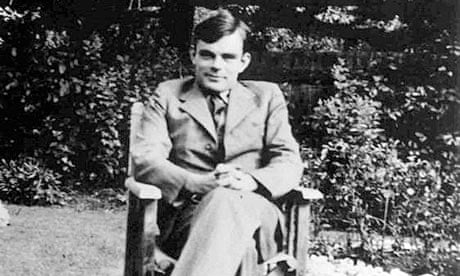Second world war papers published by the UK's most famous codebreaker, Alan Turing, are to go under the hammer today.
Technology giant Google has donated $100,000 (£62,700) towards the bid by Bletchley Park Trust, home to the National Museum of Computing, late on Monday. The second world war codebreaking centre is campaigning to keep Turing's work on public display.
But the donation still leaves Bletchley Park's fund about £400,000 short of auctioneers Christie's £500,000 valuation. The collection of Turing's papers, thought to be the most complete record of the codebreaker's work, goes under the hammer at 2pm today. Christie's said the collection was "unparalleled" and "unlikely to be repeated".
Gareth Halfacree, the technology journalist who organised online support for Bletchley Park's bid, said the works belong to a public collection "where people can appreciate their significance". There was a danger, Halfacree added, that the documents could be bought by a private collector and never seen again.
"These are handwritten notes by Turing and are thought to be the most complete collection in the world," he said.
"We have people trying to get in touch with Microsoft and Apple to see if they can replicate Google's generosity. This collection belongs in a museum on public view where people can appreciate their significance.
"The likely bidders are tech companies from Silicon Valley, just months after going public. It's the sort of thing they'd like to have on their wall. I just hope whoever buys it donates the papers to Bletchley Park."
William Newman, the son of Max Newman, a friend and Bletchley Park colleague of Turing, said the documents represented "the most complete collection of Turing's works in the world".
Turing, often dubbed "the father of the computer", created a machine that could crack the German Enigma code while stationed at Bletchley Park during the second world war.
The Manchester University scientist committed suicide at the age of 41 in 1954, two years after being sentenced to chemical castration for having a sexual relationship with a man.
Last year the then prime minister, Gordon Brown, was forced to apologise on behalf of the government for Turing's "appalling" treatment after an online petition gained thousands of signatures.
Christie's yesterday turned down Bletchley Park's appeal to bid for the papers before the auction in the hope of securing them for the museum. The auctioneers said that it would only consider withdrawing a lot from auction "if the appeal were to make a serious offer".
One of the earliest personal computers, the Apple-1, will also go under the hummer alongside Turing's work. Steve Wozniak, the Apple co-founder, may attend the auction on London's King Street, the Guardian understands.
To contact the MediaGuardian news desk email editor@mediatheguardian.com or phone 020 3353 3857. For all other inquiries please call the main Guardian switchboard on 020 3353 2000.

Comments (…)
Sign in or create your Guardian account to join the discussion